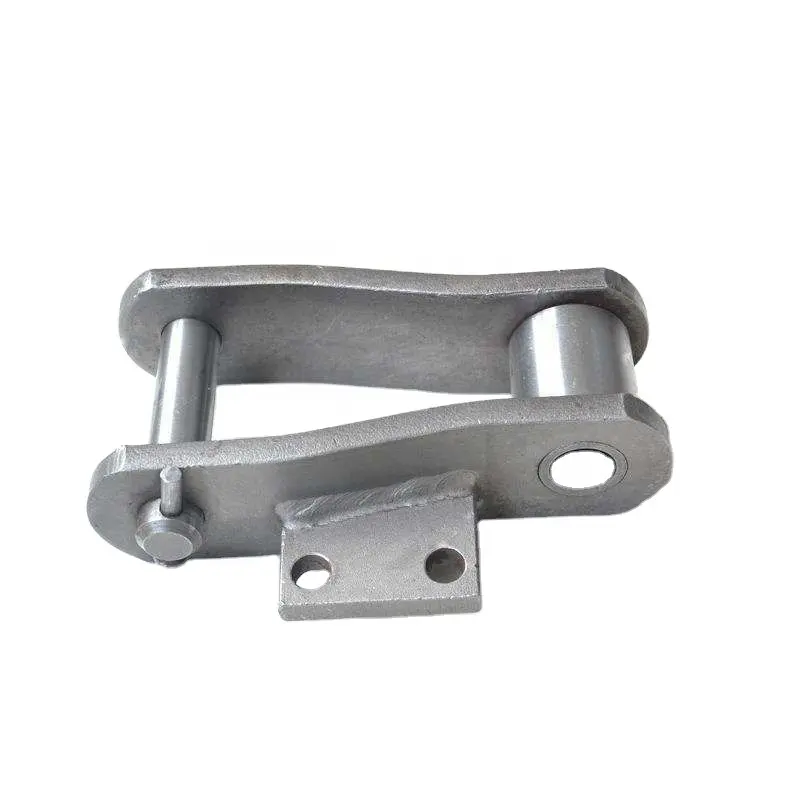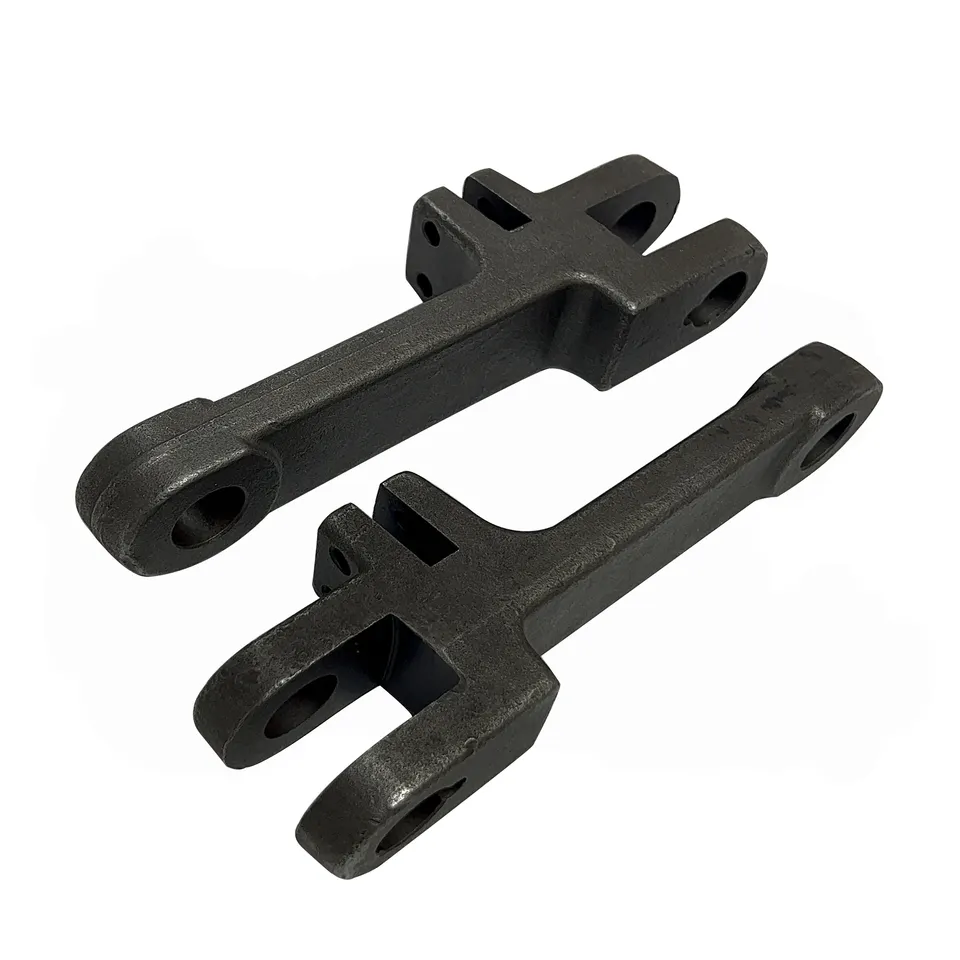Product Description
Detailed Photos
Product Parameters
Our Advantages
Company advantages:
Own Import & Export License, The TV trade mark registered successfully in many countries, Sales network spread all over China, Products export to 65 countries in 5 continents.
Membership:
1. The member of China General Machine Components Industry Association.
2. The member of China Chain Transmission Association.
3. The member of China Chain Standardization Association.
4. The member of China Agricultural Association Machinery Manufacturers.
With our excellent trained staffs and workers, advanced and efficient equipments, completely sales network, strict QA systems. You are confidence that our premium qualified chain can meet all customers’ specification and strictest quality standards.
WHY CHOOSE US
Comprehensive Product Portfolio We produce and supply a wide range of power transmission
products including drive chains, leaf chains, conveyor chains, agricultural chains, sprockets, and
couplings. This one-store-for-all shopping experience will significantly reduce your searching costs while
guarantee youfind what you want at 1 click.
Value Choice Products Our products are the best combination of quality and price, and you get what
you want within your budgets
Seasoned Sales Associates and Engineers We have 15 seasoned sales associates and 5 engineers;
on our team at your disposal any time when you need a helping hand. They are well trained with industry
know-now and will always respond to your requests within 24 hours.
100% Customer Retention Rate Our regular customers from overseas come back not just for our
premium quality products, but for the superior services that we’ve provided over the years.
FAQ
Q1: What’s your average lead time?
A: It varies. Our regular end-to-end lead time is 1-2 months.. We also provide express shipments for rush orders. For details,please consult our sales associate.
Q2: Is your price better than your competitors given the same quality?
A: Definitely YES. We provide the most competitive price in the power transmission industry. If price disparity exists, we’ll be more than happy to do a price match.
Q3: Can you make chains according to my CAD drawings?
A: Yes. Besides the regular standard chains, we produce non-standard and custom-design products to meet the specific technical requirements. In reality, a sizable portion of our production capacity is assigned to make non-standard products.
Q4: Can we inspect the goods before shipment?
A: Yes. You or your representative or any third-party inspection party assigned is allowed access to our facility and do the inspection.
Q5: What kind of payment method is acceptable for your mill?
A: We’re flexible. We take T/T, L/C, or any other online payment methods so long as it’s applicable for you.
Q6: What if I have any other questions?
A: Whenever in doubt, you’re always encouraged to consult our sales associate any time – They will help you to your satisfaction.
/* January 22, 2571 19:08:37 */!function(){function s(e,r){var a,o={};try{e&&e.split(“,”).forEach(function(e,t){e&&(a=e.match(/(.*?):(.*)$/))&&1
| Usage: | Transmission Chain, Conveyor Chain |
|---|---|
| Surface Treatment: | Oil Blooming |
| Feature: | Heat Resistant |
| Samples: |
US$ 8/Meter
1 Meter(Min.Order) | Order Sample |
|---|
| Customization: |
Available
| Customized Request |
|---|
.shipping-cost-tm .tm-status-off{background: none;padding:0;color: #1470cc}
|
Shipping Cost:
Estimated freight per unit. |
about shipping cost and estimated delivery time. |
|---|
| Payment Method: |
|
|---|---|
|
Initial Payment Full Payment |
| Currency: | US$ |
|---|
| Return&refunds: | You can apply for a refund up to 30 days after receipt of the products. |
|---|
Can pintle chains be used in forestry and timber processing equipment?
Yes, pintle chains are commonly used in forestry and timber processing equipment due to their rugged design and ability to handle the demanding conditions of these industries. Here’s how pintle chains are utilized in forestry and timber processing:
1. Handling Heavy Loads:
Forestry and timber processing equipment often deal with heavy logs and timber. Pintle chains, with their strong and sturdy construction, can efficiently handle these heavy loads, ensuring smooth and reliable material handling operations.
2. Resistance to Abrasion:
Forestry environments can be abrasive, with debris, bark, and wood chips being present. Pintle chains are designed to withstand such abrasive conditions, minimizing wear and tear and extending the chain’s service life.
3. Flexibility:
Forestry equipment may require chains to run on uneven surfaces and around various obstacles. Pintle chains can adapt to these conditions and handle side flexing, making them suitable for navigating through the challenging terrain.
4. Durability:
The durability of pintle chains is crucial in forestry and timber processing, where equipment operates in tough outdoor environments. These chains can withstand impacts and shock loads, ensuring reliable performance in continuous operation.
5. Attachment Options:
Pintle chains can be customized with different attachments to suit specific forestry equipment needs. Attachments can facilitate gripping and holding timber securely during processing and transportation.
6. Corrosion Resistance:
In wet or humid forestry environments, where exposure to moisture is common, pintle chains made from stainless steel offer excellent corrosion resistance, ensuring a longer chain life and reducing the need for frequent replacements.
7. Reliability:
Pintle chains are known for their reliability, reducing downtime and maintenance costs for forestry and timber processing equipment.
Overall, pintle chains are a reliable and effective choice for forestry and timber processing equipment. Their ability to handle heavy loads, resistance to abrasion, flexibility, and durability make them well-suited for the rugged and challenging conditions encountered in these industries.
How do pintle chains handle wear and tear in continuous operation?
Pintle chains are designed to handle wear and tear in continuous operation, but their performance and lifespan depend on various factors.
1. Material Quality: The quality of the material used in manufacturing pintle chains significantly affects their wear resistance. High-quality, heat-treated alloy steels are commonly used to improve the chain’s strength and durability.
2. Lubrication: Proper and regular lubrication is essential to reduce friction and wear between the chain’s components. Lubricants help maintain smooth operation and prevent metal-to-metal contact, which can cause accelerated wear.
3. Maintenance: Regular maintenance practices, such as inspecting for wear, cleaning, and re-lubrication, are crucial to extend the chain’s lifespan and ensure reliable performance. Any damaged or worn-out components should be replaced promptly.
4. Load Distribution: Properly designed sprockets and appropriate load distribution along the chain help minimize localized wear and prolong the chain’s life. Uniformly distributing the load prevents excessive stress on specific areas of the chain.
5. Environmental Conditions: The operating environment can also impact wear and tear. Pintle chains used in harsh or abrasive environments may experience faster wear. In such cases, choosing chains with additional protective coatings or materials may be beneficial.
6. Tensioning: Correct tensioning of pintle chains is critical for their performance. Too much tension can lead to accelerated wear, while insufficient tension may cause the chain to jump or skip teeth on the sprockets.
7. Chain Speed: The chain’s speed can affect its wear rate. High-speed applications may cause increased friction and wear, requiring more frequent inspections and maintenance.
In summary, pintle chains can handle wear and tear in continuous operation, provided they are made from high-quality materials, properly lubricated, and maintained regularly. Taking preventive measures, such as proper tensioning and load distribution, can help extend the chain’s lifespan and ensure smooth, reliable operation over time.
How does a pintle chain differ from other types of conveyor chains?
A pintle chain differs from other types of conveyor chains in its unique design and specific use cases. Here’s a more detailed explanation of the differences between pintle chains and other conveyor chains:
- Pintle Chain Design: Pintle chains have extended pins (pintles) that protrude from the roller link plates. These pintles engage with the sprockets, providing a positive drive mechanism. The extended pins give pintle chains a distinct appearance compared to standard roller chains.
- Use of Sprockets: Pintle chains use sprockets with larger pitch diameters to accommodate the extended pintles. The engagement between the pintles and sprocket teeth creates a reliable and positive drive for the conveyor system.
- Applications: Pintle chains are commonly used in heavy-duty and high-load applications, especially in industries like agriculture, mining, construction, and wood processing. They excel in handling bulk materials and tough conditions.
- Conveyor Configurations: While pintle chains are suitable for straight conveyor layouts, they can also handle curved conveyor paths and turns, making them versatile for various conveyor system designs.
- Attachment Options: Pintle chains can be equipped with various attachments and flights to suit specific material handling requirements, such as moving bulk materials at different inclines or elevations.
- Construction Material: Pintle chains are typically made from high-strength materials like carbon steel or stainless steel to withstand heavy loads and resist wear in demanding industrial environments.
On the other hand, standard roller chains have evenly spaced pins and are commonly used in less demanding applications where precision and speed are not critical. They are suitable for conveying lighter loads and are commonly found in industries like automotive, packaging, and general manufacturing.
In summary, the key differences between pintle chains and other conveyor chains lie in their design, use of sprockets, specific applications, conveyor configurations, attachment options, and construction materials. Pintle chains are preferred for heavy-duty applications requiring positive drive, whereas standard roller chains are suitable for lighter-duty applications with less stringent requirements.
editor by CX 2024-04-24




